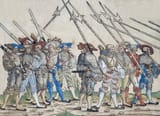>>17918143
>At length, on 11 May, Müntzer and what remained of his troops arrived outside the town of Frankenhausen, meeting up with rebels there who had been asking for help for some time. No sooner had they set up camp on a hill than the princes’ army arrived, having already crushed the rebellion in southern Thuringia. On 15 May, battle was joined.[26] It lasted only a few minutes, and left the streams of the hill running with blood. Six thousand rebels were killed, but only a few soldiers. Many more rebels were executed in the following days. Müntzer fled, but was captured as he hid in the upper storey of a house in Frankenhausen. His identity was revealed by a sack of papers and letters which he was clutching. On 27 May, after torture and confession, he was executed alongside Pfeiffer, outside the walls of Mühlhausen, their heads being displayed prominently for years to come as a warning to others.
you are probably right that the sword was never used in battle however and might not have even belonged to muntzer, it was probably a ceremonial piece or something symbolic. such types of swords were somewhat common among the peasant rebels, but more as desperate measures than anything else. scythe blades dont really make effective weapons since theyre usually very thin, which is good for efficient harvesting but bad for extended combat.
